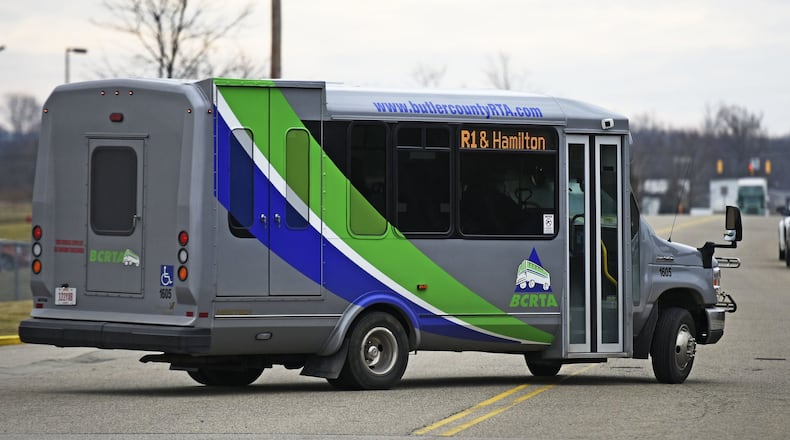It was also the first public transit connection between Greater Dayton RTA, BCRTA and Metro/Southwest Ohio Regional Transit Authority, officials said. Not only could workers from Dayton and Cincinnati connect with jobs in Middletown and Monroe, they could also connect to other routes on the Metro and Greater Dayton RTA systems as well as the Greene County CATS system.
When the WorkLink route started in September 2018, it ran six days a week and covered three work shifts for $2 a ride. It included stops at Atrium Medical Center, PAC Worldwide and near the Home Depot and Amazon distribution centers.
Matthew Dutkevicz, BCRTA executive director, said moving to an on-demand model may be more convenient than having a fixed route. The new service, BGo, started March 23 and links Middletown and Monroe with the Dayton RTA South Transit Center in Miami Twp.
“It was tough to meet employers’ schedules. Rather than try to cherry-pick, we thought going to an on-demand service would better accommodate employers and employees,” he said.
The ridership was low enough that a change was needed, officials said.
“Ridership was not what we wanted it to be,” he said. “We usually take two to three years to get a bus route going. Ridership was growing, but not enough to build critical mass.”
According to BCRTA records, from September 2018 through February 2020 there were 1,298 riders on the route, averaging about 72 riders a month.
Acting Middletown City Manager Susan Cohen said the move to an on-demand service would also avoid having empty buses on the route.
After Atrium Medical Center gave its notice to leave the partnership, the decision was made to make the change. On Monday, Monroe City Manager William Brock requested legislation from Monroe City Council to withdraw from the contract the city had with Middletown due to the low ridership. The contract was with Middletown, and the city’s buses are operated by BCRTA.
Monroe contributed $30,800 for the WorkLink bus route in 2019 and was slated to pay more than $31,000 for 2020. Middletown and Monroe and other partners contributed 50 percent of the operating costs and the remaining 50 percent was covered by federal grants.
Jennifer Patterson, assistant to Monroe’s city manager, said the feedback from businesses was that they appreciated the bus service but that it wasn’t used enough by workers.
Patterson said while Monroe is cancelling the contract, said conversations would continue with their partners on what the next version might look like.
“I don’t think the door is shut,” she said. “I think we want to find a solution. It just wasn’t used enough to feel we hit the mark for these businesses.”
Monroe Councilman Todd Hickman said, “it’s sad it didn’t work out.”
Atrium’s last day of funding was April 13, according to Atrium spokeswoman Jennifer Burcham.
“We continue to explore solutions for employees who may face transportation barriers, including on-demand options,” she said.
BCRTA also operates an on-demand bus service after the operating hours end each day on the Middletown Transit Service fixed routes for $2 a ride. The service must be ordered in advance by riders.
Getting people to work is something BCRTA continues to do with the route between Hamilton and Middletown and other connectors into Hamilton County. That route has a stop throughout the day at the Kohl’s distribution center in Monroe. BCRTA also offers a job connector routes from its Hamilton hub to locations in Fairfield, Forest Park, Springdale and Tri-County Mall.
How to use BGO Curb to Curb Service
BCRTA offers a curb-to-curb service similar to an Uber/Lyft trip within Butler County and a limited service area along the Interstate 75/Interstate 275 corridor in Hamilton and Warren Counties. Trips can be booked up to two weeks in advance for all riders. Call the customer service center at 513-785-5237 to schedule a ride or use the BCRTA mobile application.
BGo fares are $5 per trip.
About the Author

